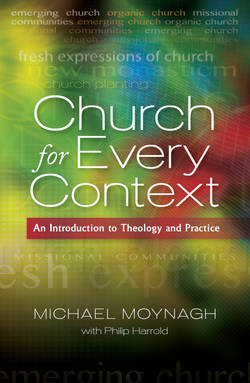Читать книгу Church for Every Context - Michael Moynagh - Страница 72
На сайте Литреса книга снята с продажи.
Networks
ОглавлениеComplexity theorists stress the importance of information-rich networks in creating amplifying feedback – ‘to understand networks is to understand self-organization’ (Chiles and Meyer, 2001, p. 83). Lichtenstein and Plowman (2009, p. 623) note that amplification is more likely to be present when leaders and members of a system encourage multiple interactions between individuals. Some theorists have gone so far as to suggest that organizations exist primarily in the conversations between their members (Shaw, 2002).
The multiplication of networks has been a key piece of the fresh expressions jigsaw. Between 1989 and 1996 Challenge 2000 was a central player in the Disciple A Whole Nation (DAWN) initiative to plant 20,000 churches in the UK by 2000. The unrealistic nature of these goals and lack of funds strongly contributed to its demise, but Challenge 2000 brought church planting on to the agenda of virtually all the denominations and spawned a number of formal and informal networks.
Through the 1990s and since, Anglican ministers Bob and Mary Hopkins (not least through their training courses and mentoring) have been at the centre of a variety of networks that have accelerated the flow of information about new contextual churches. The Hopkins played an important role, for example, in encouraging the Lincolnshire-based Ground Level Network to be instrumental in planting around 20 churches by 2011.
Networks with a significant impact include Urban Expressions, part of a looser Baptist church-planting network, Church Army’s network of pioneers, the networks encouraged by Canon Phil Potter in the Anglican diocese of Liverpool, which has developed one of the most strategic approaches to fresh expressions in the UK, the blah network hosted by CMS (formerly Church Mission Society), the learning communities formed by St Thomas Crookes in Sheffield and by the Holy Trinity Brompton (HTB) network of church plants, the Co-Mission network in London, the missional orders described below and many others. In addition are a host of informal networks, ranging from gatherings of pioneers that have a short but fruitful life to those who follow a specific blog.
The Fresh Expressions team has sought to encourage networking among pioneers. The initial assumption was that these networks would be quite stable and durable, with something of the flavour of St Thomas Crookes’ and HTB’s learning communities, whose members share their knowledge. The ‘Round Table’ of Anglo-Catholic practitioners probably comes close to this. But experience has shown that while durable networks are helpful for some, church founders often rely on well-established personal networks for emotional support and collect information about pioneering from fluid, episodic and fleeting relationships. Networking may be just as important as networks.
Thus the annual national Break-out conference of pioneers is beginning to play a critical role in enabling practitioners from different backgrounds to broaden their range of contacts. Through such gatherings, church founders can keep extending their networks rather than be limited to their existing ones.
